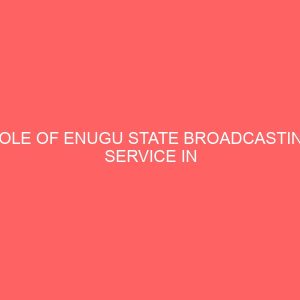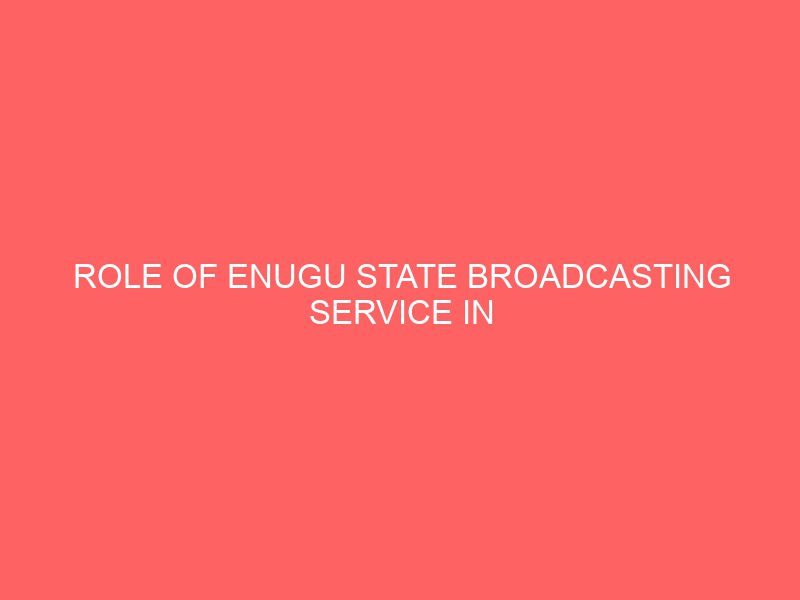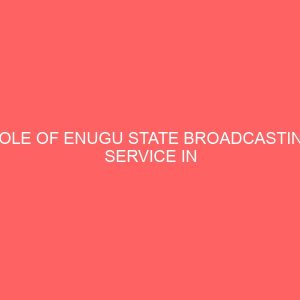Description
Abstract
The aim of this study was to analyze the Role of Enugu State Broadcasting Service in Conflict Resolution. A study of Enugu North. To achieve this aim, the survey research method was used. Subjects were drawn from the audience of Enugu North, using simple random sampling technique and purposive sampling technique. Four research questions guided the study. Research findings showed that Enugu State Broadcasting Service has contributed greatly to conflict resolution through the programmes they aired. The research also found out that there is a high level of the state government interference in ESBS affairs. To this end, the researcher recommended that the level of interference of the state government in the affairs of ESBS should be at minimum to ensure efficiency in their discharge of duties. The researcher suggested that further studies should be carried out on the impact of ESBS in sustainable programmes on conflict resolution. Programmes that aid conflict resolution should be appropriately sponsored to make for continuity.
CHAPTER ONE
Introduction
1.1 Background of the Study
Human beings as social animals have always been embroiled in temporary and continuous disputes and fracas collectively called conflicts since time immemorial. This come in the form of individuals against individuals, families against families, kingdoms against kingdoms, and more contemporary, countries against countries. Boulding, K. 1989.
According to Pruitt and Robbins, 2002. Conflict can be defined as The perceiveddivergence of interest, or a belief that the party’s current aspirations cannot be achieved simultaneously from gradual interactions between the parties. They are ultimately a direct result of the given relationships and interactions between species, will in one way or another breed friction and discontent thereby, giving rise to perceived injustice and the attendant frictions and agitations. Bercovitch, J. 2002.
However, the need to be recognized as a member of a unit is such a functional social factor, that any attempt or perceived attempt to undo or ridicule the natural statutes, breeds divergent and friction thereby gradually heating up the system to a toxic edge. Wilson,K.1988.
Thus, minimizing this friction has become imperative as it has seldom proved impossible to eliminate. This redemption notion has given birth to the theory of Conflict Resolution a brain child of the need for stakeholders to work out a route of any conflict.
Brief History of Enugu State Broadcasting Service ESBS
Enugu State Broadcasting Services comprises of radio and television outfit. It has been in existence since independence in the Eastern part of Nigeria since 1960. Enugu State Broadcasting Service was formally known as Eastern Nigeria Broadcasting Corporation ENBC. Eastern Nigeria Broadcasting Corporation television consisted of a two camera studio and control room, television with a 100 Watts television transmitter.
During the Nigeria Civil War, ENBC was known as Radio Biafran. The challenges of the war put the ability and technology to the acid test. The corporation retained its name as Eastern Nigeria Broadcasting Corporation till the end of the Nigeria Civil War in 1970. It was later recalled, East Central State Broadcasting Service ECBS, to reflect its ownership by the news which was carved out from the Eastern region.
But with the creation of new Anambra and Enugu State in 1991, and the subsequent disengagement of the staff on March 16,1992, the Anambra Broadcasting Service Enugu Awka and Enugu State Broadcasting Services ESBS. Mr. Peter Prouman was its first director general. Enugu State Broadcasting Service was established for effective information dissemination in all parts of the state. It was to bridge the information gap between the government and the governed from rural to urban areas in order to stimulate interest between government and rural folks. It is in the light of the above that the study is designed to measure the The Role of Enugu State Broadcasting Service in Conflict Resolution.
Conflict Resolution
Conflict resolution is generally conceptualized as the methods and processes involved in facilitating the peaceful resolution or ending of conflict.
Avruch,K.1990.
Often, committed group of members attempt to resolve group conflicts by actively communicating Information about their conflicting motives or ideologies to the rest of the group. By this means, they tender their intentions and reasons for certain beliefs, engaging in collective negotiations that are intended to end the conflict or crisis.
The term conflict resolution may also be used interchangeably with dispute resolution, where arbitration and litigation processes are critically involved.Burton,J.2002. In Nigeria ,and Enugu to be precise, conflicts which have had menacing effects on the life the people , especially conflicting communities or parties ,have always been resolved by the direct intervention of government.
The government intervention comes in the form of direct deployment of military and paramilitary personnel’s in war prone conflicting areas, negotiations committees that reach out to the elders stakeholders of the conflicting parties or by the use of media, through anti-conflict propaganda messages. Dentsch, M. 1983.
History of Conflicts
Axelrod, Robert. 1984. Observed that;
Competition among and between species, for food, habitats, mates, and general Survival are functionally implicit in the Process of evolution, and hence, intrinsic to their existence as living things, Prone to social and community friction.
This clearly reflects the functional imperativeness of conflicts as a social feature of any group where interactions exist. The history of conflicts therefore, is as old as man himself.
Biblically, conflict arose in the Garden of Eden, when Adam and Eve disobeyed Gods supreme injunction not to eat of the fruit in the middle of the garden. The forbidden fruit. His disobedience was recorded to have ensued a brawl between him, his wife Eve and God, the creator, prompting the later to met punitive measures on the disobedient pair.
Subsequently, civilized conflicts and wars can be historically traced to the Paleolithic and Neolithic era. Bronoski, R.1978.Reflects that, Early conflicts of the Neolithic era, emanated spontaneously from a contest to control the surpluses and resources discovered by man in that era.
Conflict of old as much as those of contemporary era had stemmed also from the selfish divergence of views, in the form of political ideologies, religious differences and ethnic and social factors.
Documented conflicts can also be traced from the Punic wars to the GrecoPersian conflicts, to the Barbarian invasions of the Romans, to the Crusaders of the Arab world, the Northern wars, the French wars, the Nazi wars, the Isreali Palestine conflict, the independence and insurgency wars, and most recently terrorist conflicts. Boulding, Kenneth. 1962.
In Nigeria, conflicts most notably can be traced back to the post colonial era, with the Biafra civil war, the most prominent example. There have been several conflicts in religions relating to certain agitations by seemingly aggrieved parties. This could be Trans-ethnic or Intra-ethnic. Chinua, A. 2012.Enugu State has also had its fair share of conflicts most notably among them include, the Umuode Community Crisis, Udi Community Crisis and the notorious Oruku Kingdom Crisis.
1.2 Statement of the Problem
The prevalence of conflict in the world and particularly in the African Sub-region has been a major source of concern to individuals, families and the society at large. People have become apprehensive about the negative consequences of conflict, due to the way and manner it erupts in our society.
However, the media have also been noted for its dysfunctional roles in the society. Since the media seek to mould the opinion of users, it is logical that their negative roles would have negative effects on society. Although the media to a large extent indeed play biggest role of ensuring that conflicts or any particular conflict receives wide public attention.
The question this research work seeks to answer therefore is, what role does Enugu State Broadcasting Service play in Conflict Resolution in Enugu North
1.3 Objectives of the Study
1. To determine the reach of audience base of Enugu North to ESBS.
2. To know the meaning and concept of conflict resolution.
3. To find out the level of interference of the state government in ESBS affairs.
4. To determine the contributions of ESBS to conflict resolution in Enugu North.
1.4 Research Questions
1. What is the reach of audience base of Enugu North to ESBS
2. What is the meaning of the concept of conflict resolution
3. To what extent does the state government interfere in ESBS affairs
4. How has ESBS contributed to conflict resolution in Enugu North
1.5 Scope of the Study
The essence of this research work is to primarily study The Role of Enugu State Broadcasting Service in Conflict Resolution. A study of Enugu North. The study intended to focus on conflict resolution in Enugu North local government area for easy analysis of data. This will reduce cost and avoid complexity which may arise due to a very large population.
However, the findings of the study will be based on the indigents of Enugu North, since they all have similar characteristics.
1.6 Significance of the Study
Studies on conflict and conflict resolution matters are of paramount importance to everyone,the conflicting parties, the government, non-warring parties etc. This study formed a documented framework exposing the ills and dangers of scourge and recommending ways to avert or sustain such occurrences in the future.
1.7 Operational Definition of Significant Terms
Conflict: Refers to disagreement or discontent between two parties usually due to perceived disadvantage by one of the parties. Conflict can be in form of disputes or crisis or extremely, war.
Propaganda: It is a message designed to persuade the intended audience to think and behave in a certain manner, preferably as planned by the broadcaster of the message.
hydra Headed: This refers to the complexity of an issue. That is, issues that assume multidimensional twist are said to be hydra headed.
Reportage: This refers to the texture of what is being broadcast.








Reviews
There are no reviews yet.